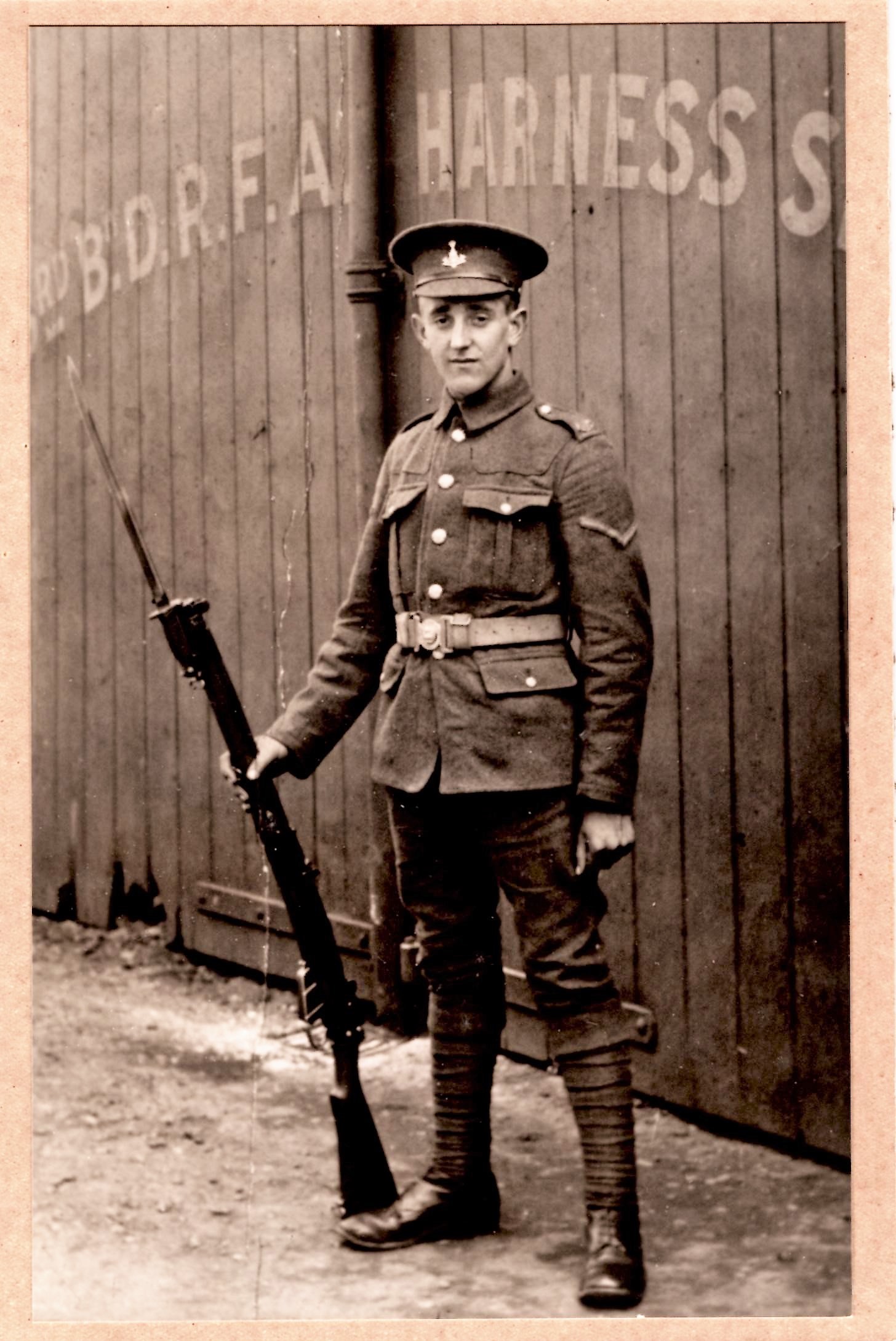
William Hird was nominated for the Ribbon of Remembrance by Dianne Evans, and his story illustrates a problem that can occur with records that are a century old.
Thanks to the original 1914-16 enlistment leger at the Green Howards Museum, we can say with some confidence that William enlisted on 10th December 1914 in the City of Durham and that he was posted to the 3rd Battalion, based at West Hartlepool on 18th January 1915.
According to his medal card 18390 Acting Lance Corporal William Hird served in France from 19th September 1915, and was entitled to the 1915 Star, the British War Medal and the Victory Medal.
William is recorded on the ‘Soldiers died in the Great War 1914-1919’ database as having died on 29 September 1916 as a Private in the 7th Battalion of the Yorkshire Regiment. This might have been the case, but on examining the battalion war diary, the 7th Battalion were away from the frontline in training and there are no records of any deaths that day. Of course soliders would often die from wounds days after an offensive, however the Green Howards Gazzette for December 1916 records that 18390 W Hird was Killed in Action – there is a separate list for those who Died of Wounds.
On further investigation, the Register of Soldier’s Effects lists William as being in the 6th Battalion when he was killed in action in France. The war diary of 6th battalion recounts the attempted assault on ‘Stuff Redoubt’ (27-30th September), a terrible fight in which both British and German troops occupied the same earthwork. Captain Archie White was to be awarded the Victoria Cross for his command during this action. A total of 381 ‘Other Ranks’ were killed or wounded during the fight at ‘Stuff Redoubt’ according to the battalion diary, making it much more likely (but not certain) that William died fighting with the 6th battalion, rather than in training with the 7th. His body was not found and he is commemorated on the Thiepval Memorial – one of 72,000 names of soliders with no known grave.

Explore more memories from the ribbon
-
Ernest Scriminger
Submitted by Paul Elliott. My Great Uncle, Ernest Scriminger was born in Leeds in 1886. He was the eldest son in a family of 4 sons and 5 daughters. he worked as a grocer’s assistant before joining the 3rd Battalion of the West Yorkshire Regiment and serving in the Boer War. He enlisted in the Green Howards in November 1904. he was almost 19 years of age, but was less than 5’4″ tall and only weighted 8 stone. The 2nd Battalion spent time in India and on garrison duty in South Africa before he transferred to the reserve. He was recalled to the regiment on the outbreak of war in 1914 and went to Belgium in the October. He would have served in the 1st Battle of Ypres and at Estaires. 1st Ypres saw the 2nd Battalion reduced in strength from 1000 men to only 300, with 250 killed and many wounded and missing. He was reported to be involved in the action at Neuve Chappelle on 12th March 1915, in which Corporal William Anderson won the Victoria Cross. Corporal Anderson lead a bombing unit of 9 men and succeeded in driving off the enemy with his bombs and those of his injured men. He is reported to have taken a large number of prisoners. He later died attempting a similar action. Ernest was wounded and taken prisoner. He died in a prisoner of war camp at Nider Ochtenhausen a year later. Only a week after receiving a letter from…
-
Warwick McCartney
Submitted by Wendy Patch I am the granddaughter of the much celebrated Harry Patch, who is famous, for the most part because he survived the First World War. But I often think of my other grandfather, or great grandfather to be precise, who didn’t survive and of his wife, who was left a widow with five young children, my grandmother amongst them. His name was Warwick McCartney and he was a deserter. Who knows why, fear, no doubt but surely just as much a reluctance to leave his wife and young family. He was caught, taken to Scotland to be as far from his family as possible (he was a Londoner) to discourage absconding. I know my great grandmother travelled up to Scotland by train to see him and that she knew when he was passing through London on his way to the front, so she went to the station hoping to see him as he passed through. Needless to say she was unsuccessful. He was put in the front lines, as I understand deserters often were and was killed, leaving his wife to manage on her own as best she could. [Warwick’s] wife was called Caroline (maiden name Farmer) and she actually had seven children when he died, my grandmother Annie, Warwick (known as Wally), Nell, Carrie, Harry boy, Bobby and Georgie. The two little boys were in hospital, we think with diphtheria and when the policeman came to the door to tell her that her husband had been…
-
Henry Tissiman
Carol Sheard of Richmond shared these details with us about her grandfather. Henry Tissiman was born on 10 July 1892. Aged 22, he enlisted on 12th April 1915 at Scarborough as L/12208 Driver H Tissiman with the Royal Field Artillery. He was posted to ‘C’ Battery, 161 Brigade. He went to France on 30th December 1915 from Liverpool and landed at le Havre. He suffered the effects of gas and was briefly hospitalised on 28th February 1916. His service record details that he was granted leave to return home 17th September 1918 until the 1st October during which time he married Emily Guest. This photograph was taken on their wedding day, 21st October 1918. He died on 30th July 1992 at Harrogate.
